Elderly nutrition: cooking & meal preparation for the elderly
Tags
Home Care
Many older people enjoy cooking and preparing meals – it can help create routine, provide a sense of purpose, and is a great way to connect with others. However in later life, health issues can make it more difficult to prepare food safely, and change the type of food and dietary options a person needs.
In this article, we’ve looked at ways you can help an older loved one remain engaged with meal times despite these challenges – from tips for staying safe in the kitchen and easy recipes, to arranging outside help.
Meal options for older people
Cooking together
The kitchen may well be the most dangerous room in the home. A study of 2000 Brits found that nearly half of all injuries that happened at home happened in the kitchen. Therefore if your loved one is keen to cook their own meals but is a little frail or forgetful, cooking together, and making small changes to the kitchen environment may be a good way forward.
To make the cooking process safer and easier for your loved one, you may want to try the following –
Make sure essential items are accessible
If someone struggles to bend or is less steady on their feet it’s important to make sure the items they use most in the kitchen are stored within easy reach. For those with early stage dementia, it can also help to label drawers or have open storage at waist or eye level, to make it easier for them to find the utensils, pots, and pans they need by themselves.
Make sure the lighting is right
Making sure there is bright, but non-glowing lighting in the kitchen, especially above chopping areas and the stove can help avoid accidents and help a loved one read instructions and labels clearly.
Replace some utensils with easier and safer versions
For older people and those with mobility issues you can buy specialist utensils with stronger grips or easy-to-hold handles. These include things like a food chopper that uses a plunging action to dice vegetables, a grip toggle for wooden spoons and spatulas, and talking kitchen scales.
Take care of the heavy lifting
Safely lifting and draining a heavy pan of boiling vegetables takes a lot of strength, and if dropped can cause serious injury and scalds. If cooking with a loved one you’ll likely want to step in and take on this task yourself.
Keep an eye on expiry dates
It’s sometimes easy to lose track of or forget what’s in the fridge. It’s good practice when cooking together to check expiration dates and throw away anything that’s no longer in date. Even if food is in date on the label, it’s worth looking for any signs of it starting to go bad, such as a change in colour, smell or texture.
If you’re batch cooking or saving leftovers for later, it can be a good idea to label the container with the date it was cooked too.
Use meal kits
Meal kits are a great, low effort solution that still allows you to cook a meal from scratch. Kits generally contain between 3-5 meals a week, with each meal having a clear step by step recipe. Ingredients are usually pre-portioned, and sometimes already prepared to – which can help avoid food waste and means your loved one doesn’t need to worry about dicing and chopping. The kits are usually delivered directly to your door, and you can choose which meals you want on a weekly basis. There’s loads of companies, for example HelloFresh, that can cater to different dietary needs too, such as vegetarian, gluten free, and protein rich.
Set timers
However, if you have something in the oven, getting your loved one use to setting timers will help them remember when it’s time to take food out.
It’s often not safe to leave a boiling pot on the stove unattended, you can also avoid accidents accidents and spillages by removing utensils from pans while cooking and turning pan handles inwards are to prevent them from being knocked over.
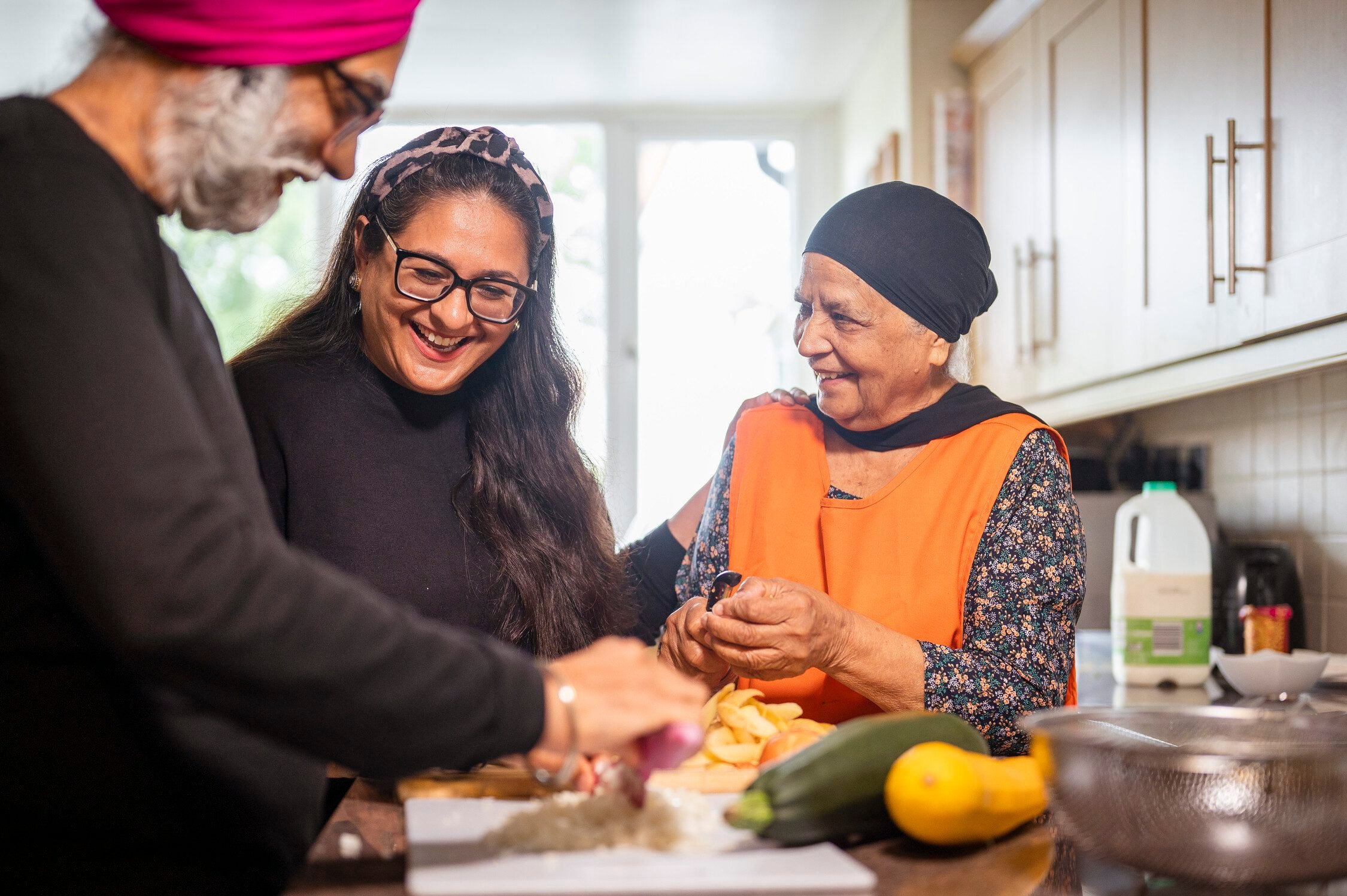
When cooking is no longer an option for a loved one
Using meal delivery services
If cooking is simply getting too much and is no longer safe your loved one may benefit from a meals on wheels service. They are sometimes operated by your local council or a local organisations for free or at a subsidised rate and deliver ready meals to your loved one at home.
If your loved one is unable to get meals on wheels through the council, you can also arrange it yourself through private companies. Popular companies include Wiltshire Farm foods, Oakhouse foods, and Parsley box.
Find out more about how a Meals on Wheels Service works here.
Cooking on their behalf
You may choose to cook meals for your loved one. If they live with you this is of course a lot easier as you can eat together as a family. If you don’t live together, you may find batch cooking helps. By doing meal prep in slightly larger quantities, you can portion it up into individual meals in Tupperware containers and store them in the freezer – meaning your loved one has a supply of frozen meals they simply need to heat up in the microwave.
What simple meals can I cook for an older person?
In later life it’s important to maintain a healthy diet, however this isn’t always easy when nutritional needs and sense of tastes can change with time.
According to the British Nutrition Foundation it’s common for a person to feel less hungry than they used to be. As smell and taste can become weaker, using different herbs, spices, and wide range of textures of food can be important too.
Older people should also choose healthier fats to lower their risk of heart disease. Unsaturated fats such as vegetable oils and omega-3 fats like those found in oily fish are preferable. And of course, eating 5 portions of fruit and vegetables a day will help an older person increase their nutritional intake. Once portion is usually around 80grams, but you can find a more in-depth guide to portion sizes on the NHS website
Staying well hydrated is just as important as nutrition – between 8 to ten drinks are recommended throughout the day.
Before cooking for a loved one, getting them involved in meal planning can be a key step in getting them engaged in their food, and helping them maintain a level of control over their own lives. Sit down with them and ask them what they would like to eat that week, working with them to ensure the foods they suggest meet their required nutrient intake, food preferences, and dietary restrictions.
If your loved one isn’t fussed about choosing their meals or is unsure what they would like to eat, the NHS healthier families initiative has some great meal inspiration, including –
Breakfast
Baked tomatoes on toast
This recipe uses cherry tomatoes which are often more sweet and flavourful than larger varieties. Dried mixed herbs and chives add extra flavour, and you can omit the hard cheese for an even healthier version.
Yoghurt parfait
You can easily prepare this by mixing together yogurt, with things like fruit and oats. For a softer meal, prepare in the evening and leave in the fridge overnight.
Blueberry and banana muffins
Another sweeter breakfast option, but with far less sugar and fat than shop bought versions. You can bake up a batch ahead of time and keep them for a few days too, making breakfast quick and easy for your loved one.
Lunch
Salmon and cucumber wraps
This quick and easy lunch used tinned salmon, which is a great store cupboard staple. Lower fat soft cheese and wholemeal tortilla wraps keep it healthy too.
Hearty vegetable and lentil soup
This soup only requires one large pot, and is a tasty way to use up any leftover vegetables. You can make a big batch and keep some covered in the fridge for up to 3 days, or split up into individual portions and freeze for up to 3 months.
Dinner
Age UK have a range of dinner recipes for delicious meals for seniors, including these easy to prepare and customisable dishes –
Ratatouille pasta
This simple pasta is a delicious meal packed full of vegetables, including carrot, parsnips and sweet potato. You could easily switch up vegetables to meet individual tastes, and while the recipe calls for tinned tomatoes, you could throw in some fresh tomatoes too if you have some in the fridge you need to use up. It only takes around 10 minutes to prepare, and 30 minutes to cook.
Beef stroganoff
Beef stroganoff is a classic dish renowned for being quite rich and indulgent. This recipe offers a more balanced meal that is still creamy and flavourful – using sour cream, mushrooms and fresh parsley. Again this is a fairly quick meal to prepare too, taking just 15 minutes to pull together and around 30 minutes to cook. You can switch out the beef for a leaner meat like turkeyt if preferred, and serving it with brown rice instead of white can help to add more fibre.
Fish pie
This is another balanced meal that includes a good amount of carbohydrates, vitamins, and minerals. You could purchase your loved one’s favourite fish, rather than a fish pie mix. Oily fish such as salmon and mackerel are particularly high in protein. You may also choose to switch out the cheese for parsley to make a healthier, yet equally tasty sauce.
Elderly meal times
Routines can become increasingly important as people get older, especially around mealtimes. It’s often even more important for those living with dementia or Alzheimer’s, disease as a lack of routine can cause confusion or frustration.
All meals and snacks should be offered around the same time every day. This can help regulate hunger patterns and create an appetite.
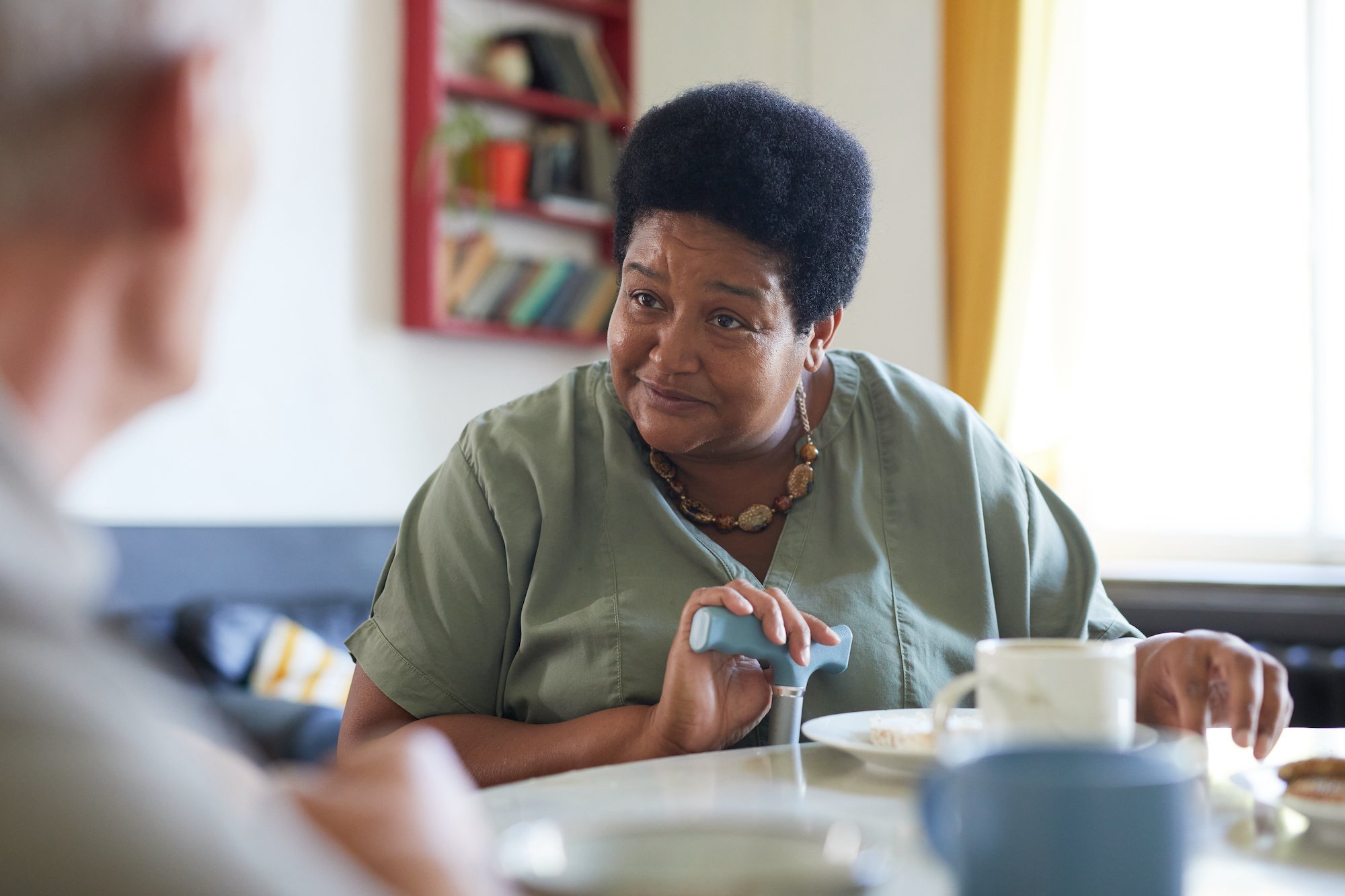
What to avoid
Eating raw or runny eggs used to be considered as a food poisoning risk for older people, due to their more vulnerable immune systems. However, Salmonella cases have significantly dropped in recent years. It’s now generally advised that as long as an egg has the British lion symbol on it, it should be safe to eat if undercooked.
It’s also advised by the NHS that fruits such as strawberries shouldn’t be eaten without being washed first to remove any fertiliser that may have come from manure, or contaminates.
Older people should also avoid high-sodium foods, as too much salt can become a problem – especially for those with a history of hypertension, as it can lead to high blood pressure and other risk factors for heart disease.
Caffeine and high sugar drinks should also be avoided if possible. Caffeine can cause increased anxiety and lead to sleeping problems, while sugary drinks can raise blood sugar levels and increase the risk of diabetes.
How can a live-in carer help with cooking for the elderly?
If a loved one is not as safe as they once were in the kitchen, then live-in care from Elder could be the answer. Perhaps hobs are left on with no pan, or the fridge is empty or filled with food past its best-before date. These can all be signs that an older person needs help in the kitchen to keep themselves well-fed.
Not only can a live-in carer help you or your loved one to prepare and cook meals that they enjoy but it can also help them to stay healthy and make mealtimes as enjoyable and stress-free as possible.
When there are real concerns about a loved one’s ability to look after themselves and to eat and drink well, home care could be the solution. Whether a home carer is required to cook favourite suppers or create tempting menus, they can prepare the nutritious and healthy meals your loved one craves.
Sometimes older people need reminding to eat and having some company can help with this – as well as providing an incentive to eat for those who aren’t prioritising it.
A live-in carer can –
- Work with your loved one to prepare food
- Plan meals in line with dietary requirements
- Check food supplies and do shopping
- Check expiry dates
- Clean up after a meal and wash up
- Help prevent malnutrition by offering smaller meals and snacks throughout the day
- promote healthy food choices
- Teach older people simpler cooking methods
- Provide an activity to keep people occupied while food is cooking
- Reduce social isolation and loneliness by sharing mealtimes
- Enable people to stay independent at home
Food for Thought: Healthy Eating for the Elderly – Food Scientist, Joanne Holmes on Enhancing the Eating Experience
Food Scientist and nutritionist Joanne Holmes’ interest in nutrition and later life led to her doctoral research exploring the myriad factors that affect the complete meal experience for those living in care. We talked to her about the importance of socialisation, stimulation and choice to encourage healthy appetite in older people.
Frequently asked questions
Why is nutrition important for the elderly?
As people age, certain health conditions can become more likely – and having good nutrition can help to reduce the risk of these. Nutrition is important at any age, but maintaining it for the elderly is essential – as they may struggle to do so on their own.
What can I cook for an elderly person?
When cooking for an elderly person, having a balanced plate is important but do make sure,
over anything else, to find out what they actually would like to eat. They are far more likely to eat something they enjoy – and sometimes simply eating something is better than nothing.
Read more later life articles
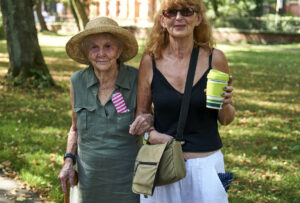
12 summer safety tips for the elderly
It’s important for everyone to take care in hot weather – anyone can become unwell if they’re exposed to soaring temperatures. However, for older people
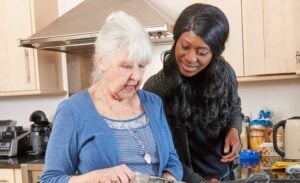
Live-in care vs other types of care
Live-in care vs other types of care Navigating elderly care options for a loved one is a significant decision. While care homes are a common

Defining Dignity in Later Life – Interview with Liz Lloyd
We talked to Liz Lloyd about personal and social perceptions of age, the challenges of identity, empowerment and choice.

The Challenges of Vegetarians and Vegans Living with Dementia
We talk to Amanda Woodvine about the challenges faced by older vegetarians and vegans receiving care. Read more here.

How much does live-in care cost?
How much does live-in care cost? Live-in care provides one-to-one support in the comfort of your loved one’s home, but how much does it cost?
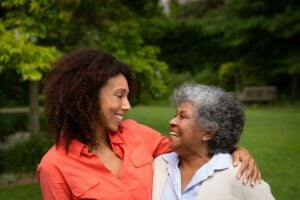
How much does respite care cost?
Respite care offers short-term relief for primary carers, and the cost can vary widely depending on the type of care, location, and level of support